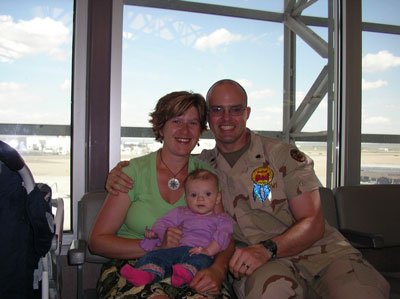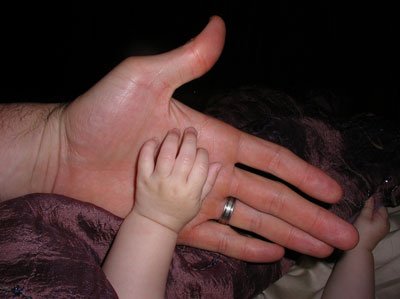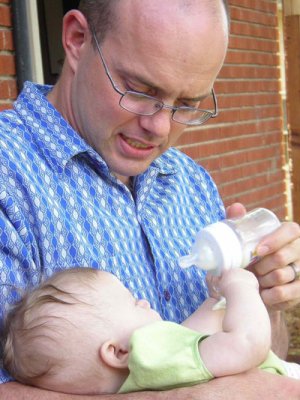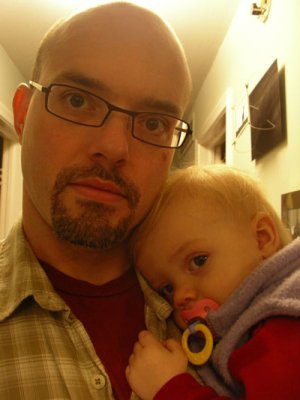I Heard My Daughter’s First Cry From 7,000 Miles Away. Hours Later, I Was in a War Zone.
In the wasteland deserts of Kuwait, I crammed my gear into duffle bags, preparing to fly into Iraq for a yearlong deployment. At the same time, but on the other side of the planet, my wife gave birth to our first child.
I packed ammo pouches, desert uniforms, and gas masks, ran to talk to my laboring wife on a satellite phone, hurriedly packed trucks with more gear, ran back to the phone center just in time to hear that labor had started, then hopped onto a bus and headed to the air base. I was told there would be no phones there. So, I kept taking photos—of formations of soldiers, of the vast Kuwait desert, of a camel—with my watch in the foreground. I wanted to have that photo around so I could say, “See, honey, this is where Daddy was when you were born.”

Chez Chesak’s first child was born just as he headed to war. He met her five months later at the Boise, Idaho, airport, while home on leave. Photo courtesy of the author.
When we arrived at the air base, we learned there was actually another phone center available. My heart pounded in my rib cage, and I started to sweat, needing the briefing to be over immediately. The arduous speeches and warnings finally done, I absconded from assisting my Idaho National Guard comrades in their gear palletizing duties and sprinted to the phones.
Sally’s contractions in the Boise, Idaho, hospital room were coming faster and stronger. I burned through my third prepaid phone card of the day and had dinner—a breakfast bar and some Army peanut butter, the only food I found in my pockets. Finally, after many calls and through the cheers of friends, I heard my daughter’s first wails from 7,000 miles away.
Two hours later, we boarded a transport plane and flew into a war zone. As I sat in the near darkness, lit only by one blue light near the front of the aircraft fuselage, I thought flatly, “I’m a daddy.” The words rang hollow in my head then quickly slipped away as I focused instead on the long deployment ahead.
Over the next five months, I eased Humvees through rain-soaked palm groves and over slick mud “roads,” shivered in guard towers through freezing winter dawns, and once spent 22 hours guarding a polling place during Iraq’s elections. Through it all, my wife, Sally, sent lots of photos of our daughter, Lillian. As I looked at them, I could only think, OK, we have a baby. I am a father. I felt little more than apprehension; I couldn’t stop wondering what it meant to now be a father to a baby girl, or at least to a stack of photos of her.
On one hand, I had dreamed about having a child all my life, running over the scene in my mind so often that I knew exactly what I would say to that newborn—I’d settled on three specific sentences. On the other hand, I had no idea what it meant to be a father. I was brand-new to babies. I had zero experience handling, caring for, or loving little ones. Sitting in Iraq with scattered photos of a newborn, I could recognize that I had a daughter, but I had no idea what that really meant.
Then I left Iraq for two weeks of leave.
After 69 hours of processing, paperwork, briefings, repeated customs drudgery, 10 time zones, four countries, and travel in Humvees, buses, two cargo planes, and three commercial jets, I walked up the Boise airport jetway, embraced Sally, and laid eyes on the 5-month-old baby in a stroller behind her.
Award-Winning Journalism in Your Inbox
“Who’s this?” I shouted, both out of the exuberance of being home and unabashed pride in meeting my daughter, for me the emotional equivalent of the day of her birth.
Through tears, Sally choked, “This is Lillian. Lillian, meet your daddy.”
Still in desert camouflage, I picked her up carefully, gave her a gentle hug, and followed up with a quick smooch on the cheek—my first kiss to my first child. We found seats in the terminal, passing a woman who, having overheard our exchange, tried to hide her tears. A United ticket agent took our picture. Our first family portrait. That day was full of firsts: our first meal as a family of three, first daddy/daughter playtime, first diaper change. We documented all of it.

Chez Chesak looks at his daughter’s tiny, plump hand. Photo courtesy of the author.
But as I lay awake later that night—joyful that I could reach over and hug my wife, drink clean water from a tap, sit out in my yard and watch the sunset over the Idaho foothills with no concern over roadside bombs—I didn’t know what it meant to have Lillian in my life.
Early the next morning, I went into Lillian’s room, still jet-lagged. As I approached her crib, Lillian’s eyes locked onto mine. She smiled, issued a lilting little “coo,” and then yawned a tiny yawn, complete with a flailing stretch of her plump arms. My heart liquefied and poured out of my chest.
I was hollowed and fulfilled. I had melted.
Over the next few days, I became enraptured by her cooing, her staccato laughs, her very determined attempts to crawl. “I think I’m in love,” I said to Sally as I slid into bed one night.
With my wife as my guide, I learned critical parenting skills—changing diapers while cradling a cell phone between my neck and shoulder and working on a computer with one arm.
I held serious phone conversations about U.S. foreign policy while sticking my tongue out to entertain Lillian. I hummed Raffi’s children’s songs while in the shower. I became fiercely proud of the Dora the Explorer sun shade on our car, which seemed to broadcast loudly, “Hey, family in here!”
A few nights later, Sally asked me, “So, what is it like to be a daddy?”
The words tumbled out. “It is absolutely amazing. It is incredible. It is literally awesome.” I told Sally that I almost cheered when a determined “Lilli Bean” fumbled her way into finally getting her pacifier into her mouth the right way. I said that every day I became more and more enraptured just watching her grow and learn. I loved that each time I held her up on her feet I helped her develop equilibrium, and each time I made a funny noise I helped her learn about speech.
I knew I wanted to spend every possible moment of my time with her—teaching her, guiding her, fortifying her to someday unleash her own unique self upon the world. But you’re never really, completely home while on leave, because you cannot stop thinking about the march of time that drags onward, pulling you closer to going back to war. You are like a condemned man, constantly aware of the passing of days, then hours, yet trying to forget it all and enjoy what moments you have left at home. Just as I started to learn what fatherhood meant, my time was up.

Chez Chesak feeds his new daughter, Lillian, whom he met when she was five months old. Photo courtesy of the author.
The night before my return flight, I mechanically packed my bags and slipped into bed around 4 a.m. for a few hours of sleep, my stomach sick, a sodden ball of knots. Two hours later, I put on the uniform, laced up the boots, and, contrary to everything that my soul knew was true, contrary to the voices in my mind screaming to do otherwise, I stepped out of my home, stepped into the airport, stepped onto a plane.
After 72 hours of travel on five different flights, reams of paperwork, and incessant waiting in line after line of similarly camouflage-clad soldiers, I was back in the Middle East. Returning to my base, I felt emotionless, empty, and drained, as if during the return, my soul had been wrung from my body.
Seeing my friends helped, but it still took a few days to get back into the groove of patrols, “quick reaction force” response teams, “knock and search” raids, and guard duty. But the deeper emotional damage had been done. I could ignore Lillian before—I hadn’t known who she was. That was impossible now. Now I heard the laughter and the coos behind the smiling photos pinned next to my bunk.
Soon after my return, my squad drew an extra graveyard shift of guard duty at the summer palace of “Chemical Ali,” the Saddam henchman responsible for gassing thousands of Iraqi Kurds. Around three a.m., I stood alone atop an abandoned building in the tightly packed urban compound. By chance, I looked down into the courtyard of one of the homes across the street. In the dim light of the few working streetlights, I saw a mother with her fussy newborn, rocking him on a porch swing.
My heart liquefied, dropping away like a molten stone. I felt sick. My mind raced, trying to calculate the time I had left in country and then trying to stop as I realized I still had several months. I walked the rooftop’s perimeter, machine gun in hand, trying to calm down.
Finally, I tiptoed toward the edge, just close enough that I could see the mother over the rooftop’s wall. I tried to appear nonchalant, but I just kept staring, watching her rock and sing to her child. Finally, she noticed me and, probably assuming I was just another lust-filled, female-starved gawking soldier, went briskly inside. That empty night crept by in excruciating slowness like none before.
While simply difficult before leave, the days in Iraq now became interminable. Under the hot Iraqi sun, I stood sweating in the gunner’s turret of an armored Humvee and worried if Lillian was sleeping well. I stood lonely vigil in concrete guard towers, wondering what she was learning that day. I roamed the empty nighttime streets of Kirkuk, wondering who she would be when I got home. I did what I could to make the days pass: lifting weights, running supply convoys, watching laptop movies, reading books, and always patrolling. But the days and hours dripped past with agonizing slowness.
Some relief came from a used webcam. Several weeks after leave, we had a wireless Internet network installed and soon we were all surfing the web and emailing loved ones directly from our bunks—this was certainly not our fathers’ war.
Now, each night (Sally’s morning), I watched Lillian nurse, or nap angelically on the pillow in Sally’s lap, and occasionally lunge, grab the camera, and stick the whole thing in her mouth, allowing me a glimpse of her two brand-new teeth.
Sally texted me about how she cheered up our daughter by holding her upside down. I would see (but not hear, since I didn’t have audio) her screaming wails of laughter on my laptop screen. Soon “upside-down baby” became a hit with my whole squad, sometimes with grown men running into our squad bay when they heard “upside-down baby” was on. Many nights I had several soldiers, young and old, gathered around my computer for a chance to see my daughter’s bitmapped, upside-down face, plastered with a huge, screaming smile.
But the webcam also reminded me nightly of my absence, its images both treasure and torture. Seeing her digitized smile made me ache. Watching jerky, bitmapped images of her crawling made my eyes well up. One night I saw her stand for the first time. Another delivered my first glimpse of her eating solid food. I watched her grow and learn and thrive from 10 time zones away, while concussions from car bombs rattled our barracks windows.

Chez Chesak and his daughter, Lillian, after he returned from war, missing much of her first year of life. Photo courtesy of the author.
Lying in my bunk, I stared at the photos tacked to my plywood wall. I’d forgotten to whisper those three sentences. While she grew into a little girl, I ran around in Humvees hoping I’d make it home to her. Harder than all of that was hearing about the difficulties my wife faced. The car needed repairs, the grass had to be cut, the floors needed vacuuming, and the bills needed paying. Sally managed it all, alone, while maintaining the constant eat/sleep/excrete cycle of a baby.
With our families far away from Boise, we leaned heavily on good friends, including a woman who stayed for two days to care for Lillian after my wife was stricken with food poisoning. Hearing about it felt like a gut punch. I wanted to help, to do something, anything. I wanted to take Lillian while Sally showered, or slept, or went out for a solitary hike. But I was stranded on the other side of the world.
Slowly the countdown to our departure date ticked down from triple digits, to double, and then, almost unbelievably, to single days. Our stoic, stone-faced replacements arrived and soon we cheered the takeoff of each flight toward home: the transport to Kuwait, the chartered jet through Ireland to Fort Lewis, Washington, and then one last, short flight back to Boise.
Amidst the signs and balloons of the small crowd of families gathered on the tarmac, I found my wife. We didn’t say a thing, just held each other and kissed and kissed and kissed and kissed. After loading my duffle bags into the back of our car, Sally offered Lillian to me and I held my daughter in my arms again, gazing into her big gray eyes. Wide-eyed, she stared back for a moment, then turned to her mother and pushed me away.
She didn’t know me. It is among the myriad and intangible casualties of warfare and as old as warfare itself. Two other soldiers I deployed with missed the births of their children. Sixteen years before I missed Lillian’s birth, a Marine in my unit stood knee-deep in blowing snow in a rice paddy in Korea when another Marine handed him a telegram and said curtly, “Congratulations.”
He had a son born that day. He smiled, put the telegram in his pocket, and kept on training. (He still has the telegram.) My father missed his own share of children’s birthdays and a wedding anniversary during a year-long stint in the highlands of Vietnam, with only letters and the occasional reel-to-reel tape recording to stay in touch.
Our Journalism Depends on Your Support
Four thousand people made up my brigade in Iraq; 150,000 soldiers deployed that year alone. While the number of deaths by roadside bombs, vehicle rollovers, and helicopter crashes made the front pages and technicians at Walter Reed Medical Center tracked limbs lost, no one kept track of the intangible costs. No one counted the number of nightmares veterans had—and continue to have—back home. No one counted the breakups of relationships or the alcoholic benders. No one counted the days military parents missed with their children.
At least I made it home whole. I could start counting anew the days I spent with Lillian. Iraq faded slowly into memory as I jumped into a few weeks of accelerated “daddy school,” with Sally teaching me how to feed our daughter, play with her, get her in and out of a car seat, and secure her while she slept.
One day, I held onto Lillian as we danced in the middle of the living room to some blaring pop song. She giggled and squealed as I spun her around the room—the most beautiful sound I’d ever heard. I hugged my 11-month-old Lilli Bean close and said the words I had for decades imagined saying to my firstborn on the day of their birth.
“Hello, Lillian Rose Chesak. I love you. Welcome to the world.”





Comments are closed.